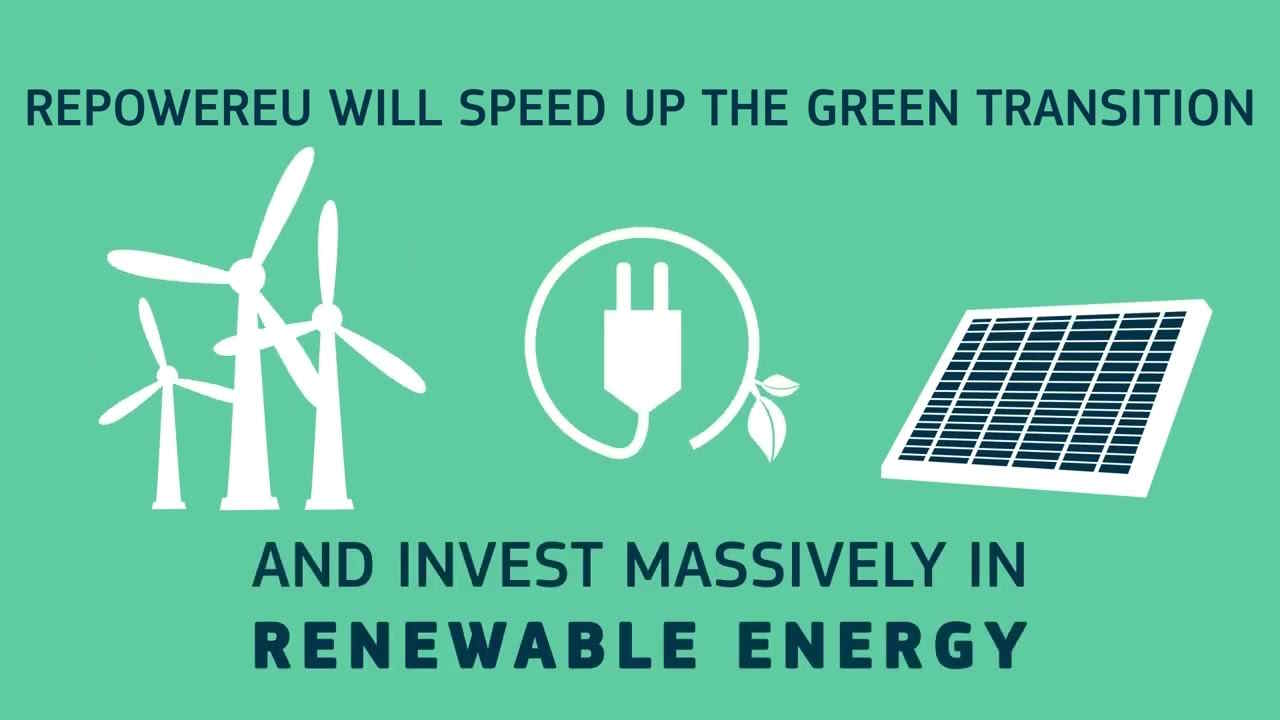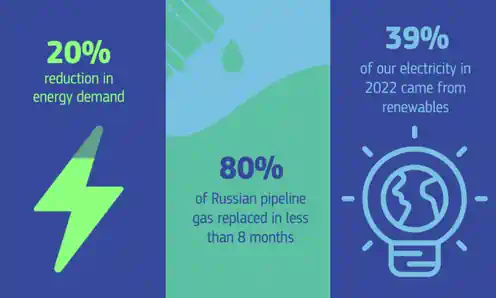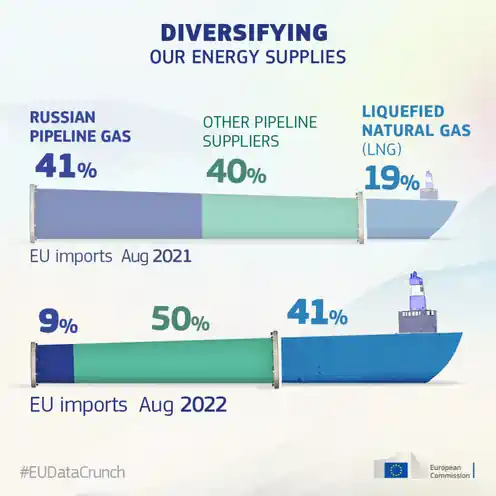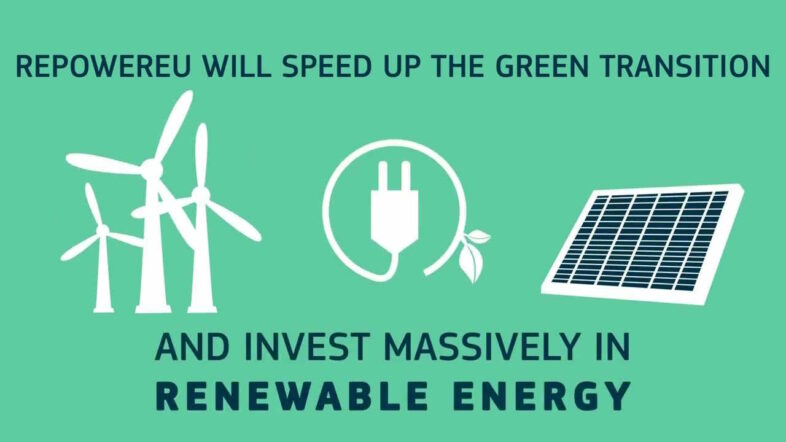A new EU wide plan known as the “REPowerEU Strategy” has become law. It will be a game changer for the European Biogas Industry and a massive boost for biomethane production from biogas which will drive the development of many more anaerobic digestion facilities across the European continent.
REPowerEU is a European Commission initiative to phase out reliance on Russian fossil fuels by 2030 in reaction to Russia's invasion of Ukraine in 2022.
Introduction to REPowerEU and the Proposed Increase in Biomethane Production
To put it another way, REPowerEU is an innovative energy project aimed at increasing the share of renewable energy sources in the European Union. The proposed increase in biomethane production is an essential component of the REPowerEU strategy.
Biomethane is a renewable energy source produced from organic matter, such as agricultural waste, wastewater, or biodegradable household waste. This sustainable fuel is considered in the REPowerEU Strategy to be a significant solution for decarbonizing the transportation sector, heat, and power generation.
The proposed large increase in biomethane production is crucial for the European Union to achieve its ambitious decarbonization targets. The EU aims to achieve carbon neutrality by 2050, and renewable gas is expected to play a significant role in this transition.
The production of biomethane (using the anaerobic digestion process) is a carbon-neutral process, with the potential to reduce greenhouse gas emissions and contribute to the circular economy.
REPowerEU aims to support the deployment of biomethane production facilities by providing incentives for investment in new projects and facilitating the development of supportive policies.
The project also aims to promote the use of biomethane in transport, heating, and industrial processes.
In conclusion, you can think of the REPowerEU Strategy either as an essential project for the European Union in achieving its climate and energy goals or as an instrument to help the EU replace non-renewable gas supplies from Russia. And, by doing that to help in the defeat of Putin's war in Ukraine.
The proposed increase in biomethane production is a crucial component in decarbonizing the economy and reducing greenhouse gas emissions. This sustainable fuel holds significant potential in helping to create a more environmentally friendly and prosperous future for Europe.

MEPs from Renew Europe highlight the importance of REPowerEU Strategy in achieving energy autonomy and supporting vulnerable citizens across the EU
Renew Europe MEPs have expressed their firm belief in the vital role that REPowerEU can play in achieving energy autonomy and supporting the most vulnerable citizens in the European Union. (Renew Europe (Renew) is a liberal, pro-European political group of the European Parliament founded for the ninth European Parliament term. Source: Wikipedia.
The REPowerEU Strategy initiative is considered by Renew to be a groundbreaking proposal aimed at accelerating the transition towards renewable energy while fostering social justice and economic growth.
It has to be true that in the wake of the COVID-19 pandemic, the need for a sustainable and resilient Europe has become even more pressing!
The Renew Europe MEPs recognize that REPowerEU Strategy can help to achieve this goal by:
- creating new job opportunities,
- reducing greenhouse gas emissions, and
- empowering communities to take charge of their energy systems.
REPowerEU is based on the principles of energy democracy, which means that citizens have a say in the production and distribution of energy. The initiative aims to promote renewable energy projects that are owned and operated by local communities, cooperatives, and public authorities.
This approach seems to be approved by the consensus that this can lead to a more equitable and fair energy system, where everyone has access to affordable and clean energy.
The Renew Europe MEPs have underlined the importance of protecting vulnerable citizens, particularly those who are struggling to pay their energy bills.
REPowerEU is intended help to alleviate energy poverty by:
- providing energy-efficient upgrades to homes,
- supporting community-based energy projects, and
- investing in energy-saving technologies.
In conclusion, REPowerEU Strategy has the potential to transform the energy landscape of the EU and create a more sustainable and just society. For this reason, the Renew Europe Plan group of MEPs are committed to:
- supporting this initiative and
- ensuring that it receives the necessary funding and political backing to make a real difference.
REPowerEU Strategy Achievements: Promoting Cross-border Projects and Transparency in EU Funding
REPowerEU, a European Union (EU) funded project, has achieved significant milestones in its efforts towards promoting cross-border projects and transparency in EU funding.
The project was initiated in 2017 with the aim of increasing the uptake of renewable energy sources across Europe. The project has been successful in achieving its objectives through its multi-pronged approach.
One of the significant achievements of the project is promoting cross-border projects. The project has already facilitated collaborations between different countries and stakeholders, including local communities, businesses, and government bodies. Through these collaborations, the project has identified potential areas for renewable energy projects and has facilitated the exchange of knowledge and technology.
This has already resulted in the early development of various renewable energy projects across different countries, including wind, biogas, solar farms, and hydropower projects.
The project has worked to increase awareness among stakeholders regarding the availability of EU funding for renewable energy projects. The project has also been a part of the development of guidelines and best practices for the implementation of EU-funded projects.
This has increased the transparency in the allocation of EU funds and will ensure that they are used effectively and efficiently. Overall, the REPowerEU Strategy has made significant strides towards promoting renewable energy sources in Europe.
Its achievements in promoting cross-border projects and transparency in EU funding are commendable and have paved the way for further development in the renewable energy sector.
Renew celebrates success in pushing for transparency and consultation in EU Recovery Resilience Facility (RRF) with publication of list of final beneficiaries.
Renew, a leading member of the European Parliament is delighted to announce its tremendous success in pushing for transparency and consultation in the EU Recovery Resilience Facility (RRF) with the recent publication of the list of final beneficiaries.

The commitment to transparency and accountability in the allocation of EU funds is an important step towards ensuring the efficiency and effectiveness of the RRF in supporting the EU's economy and mitigating the effects of the Covid-19 pandemic.
Renew's persistent advocacy and active engagement with key stakeholders have yielded a transparent process that has fostered trust in the allocation of funds from the Recovery and Resilience Facility (RRF).
By publishing the final beneficiaries' list, the European Union (EU) enables its citizens to hold their respective governments accountable for the responsible utilization of these funds, thereby promoting sustainable and inclusive economic recovery.
The significance of this achievement by Renew cannot be understated, as it contributes to bolstering the EU's future and nurturing a culture of transparency. Through the publication of the final beneficiaries' list, Renew demonstrates its unwavering commitment to ensuring that the economic recovery efforts within the EU are conducted in a manner that is both transparent and accountable, while also empowering citizens to actively participate in the decision-making processes that shape policies.
Moving forward, Renew Strategy remains steadfast in its dedication to advocating for transparency and inclusive consultation in all EU recovery programs and policies. By doing so, the organization strives to ensure that funds are directed towards sustainable and inclusive growth, promoting the well-being and prosperity of EU citizens.
RePowerEU Negotiations Strive for Balance and Flexibility in Addressing Energy Crisis Challenges
The ongoing negotiations of RePowerEU are focused on striking a balance and achieving flexibility in addressing the pressing challenges posed by the energy crisis.
This initiative aims to ensure access to affordable, sustainable, and clean energy for all European citizens while reducing greenhouse gas emissions and promoting energy efficiency.
To achieve these goals, the negotiations focus on developing innovative approaches that can adapt to the rapidly changing energy landscape and respond to market realities.
The RePowerEU Strategy team is working towards developing a comprehensive energy strategy that prioritizes renewable and energy-efficient solutions and promotes the integration of these solutions into the energy system.
The negotiations focus on identifying the most promising technologies that can enhance the energy mix and help in transitioning towards a low-carbon economy while ensuring energy security and affordability.
Furthermore, the talks aim to foster a supportive environment for investment in sustainable energy technologies, unlock financing for energy-efficient projects, and promote cooperation between stakeholders. By balancing the needs of all parties involved and fostering flexibility, the RePowerEU Strategy negotiations aim to tackle the energy crisis head-on and ensure a sustainable energy future for Europe.
RePowerEU Report Completed: Governments Urged to Think Long-Term for Big Investments and Reforms
 The RePowerEU report has been completed, and the results are urging governments to adopt a long-term focus on big investments and reforms. This report represents a critical milestone in the global movement towards clean, sustainable energy, and underscores the need for strategic planning and investments to create a more resilient and stable energy system.
The RePowerEU report has been completed, and the results are urging governments to adopt a long-term focus on big investments and reforms. This report represents a critical milestone in the global movement towards clean, sustainable energy, and underscores the need for strategic planning and investments to create a more resilient and stable energy system.
The report highlights the importance of developing a comprehensive energy strategy, which includes both renewable and conventional sources, to ensure that energy security is maintained over the long term. The authors of the report suggest that governments should focus on implementing policies that will encourage the development of clean energy technologies, as well as increase the use of energy-efficient technologies and practices.
Additionally, the report recommends that governments should invest in research and development to help drive innovation in the energy sector and establish long-term energy targets to give investors the confidence they need to make significant investments in clean energy. Overall, this report represents an important step forward in the global effort to transition to a clean, sustainable energy system.
By urging governments to take a long-term perspective on energy investments and reforms, the authors of the report are helping to ensure that the transition to clean energy is both successful and sustainable.
It is now up to government leaders and policymakers to act on the recommendations in the report and take the steps necessary to create a more resilient and sustainable energy system for generations to come.
Importance of Government Responsibility in RePowerEU Transition: A Call for Citizen Monitoring.
The transition to clean and renewable energy has become a pressing concern for governments worldwide as they work to meet global emission reduction targets and tackle the threat of climate change. As such, the European Union has initiated the RePowerEU project, aimed at accelerating the transition to greener energy sources and reducing greenhouse gas emissions.
However, the success of this project is heavily reliant on the responsibility of governments to ensure that they meet their commitments and implement effective policies to support the shift towards clean energy.
Furthermore, there is a need for citizen monitoring to ensure that governments stay accountable and on track towards achieving their goals. The importance of government responsibility in the RePowerEU transition cannot be underestimated. Governments must take a leadership role in implementing policies and regulations that incentivize the adoption of renewable energy sources. They must invest in research and development to drive innovation in this space and encourage private-sector investment.
Furthermore, they must continually assess their progress and adjust their strategies where necessary to ensure that they are meeting their targets. However, it is equally important that citizens play an active role in monitoring the progress of the transition. Citizen monitoring can help to hold governments accountable for their commitments, raise public awareness of the importance of the transition to clean energy, and help to identify areas where governments need to step up their efforts.
By working together, governments and citizens can ensure that the RePowerEU transition is a success, paving the way for a brighter, cleaner, and more sustainable future.
REPowereu Legislation Timetable for Implementation and Progress
The REPowereu initiative has been introduced with the aim to accelerate the transition towards a sustainable and carbon-neutral future in the European Union. The legislation timetable for implementation and progress is a critical component of the initiative, outlining the specific steps and milestones that need to be achieved to fulfil the objectives of the program.
The EU has set ambitious targets, including a 55% reduction in greenhouse gas emissions by 2030, and a net-zero emissions target by 2050. To achieve these goals, the legislation timetable outlines a series of measures that need to be implemented over the next decade. These include promoting renewable energy, improving energy efficiency, and increasing the use of electric vehicles.
Additionally, the timetable will establish a framework for the development of sustainable infrastructure, such as energy-efficient buildings and smart grids. The implementation of these measures will require significant investment and collaboration between the EU member states.
The REPowereu initiative will provide a framework for cooperation and coordination between member states, ensuring that progress is consistent and transparent.
The legislation timetable will also provide a mechanism for monitoring progress towards achieving the targets set for 2030 and 2050. Overall, the REPowereu legislation timetable for implementation and progress represents a significant step towards achieving a sustainable and carbon-neutral future in the European Union.
It provides a clear roadmap for action, ensuring that the EU can meet its ambitious targets and demonstrate leadership in combating climate change.

Summary and Conclusion
In conclusion, the findings of this study provide significant insights into the dynamics of the phenomenon being investigated. Through the systematic review and analysis of relevant literature, it was revealed that there are multiple factors that contribute to the occurrence of this issue.
These include inadequate access to resources, poor communication and coordination among stakeholders, as well as inadequate knowledge and training among relevant professionals. Furthermore, it became apparent that these factors are often interrelated and impact each other in complex ways. Despite the challenges identified, there are various strategies that can be employed to address this issue.
These include improving resource allocation, fostering collaboration among stakeholders, and investing in training and education initiatives. Additionally, it is crucial that policymakers and other relevant bodies allocate sufficient resources and attention towards this issue to ensure that it is effectively addressed.
Overall, this study highlights the importance of a comprehensive and collaborative approach in addressing complex societal issues. Through a concerted effort to address the underlying factors contributing to the issue, it is possible to achieve sustainable solutions that improve societal outcomes.
This study provides valuable insights for policymakers, practitioners, and other stakeholders seeking to address this issue and highlights the need for continued research and evaluation to improve our understanding of this phenomenon.





